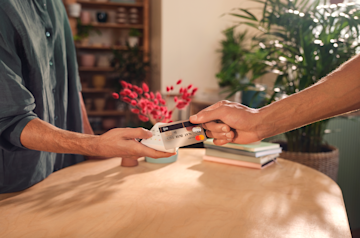
The parent’s guide to pocket money—here’s what you need to know
Trying to decide whether to give your child or teenager pocket money? Also called allowance, pocket money can be a great way for your child to learn about money.
6 min read
Trying to decide whether to give your child or teenager pocket money? Also called allowance, pocket money can be a great way for your child to learn about money. Read on for some advice on when to start giving your child pocket money and how to determine the right amount. Let’s dive in!First of all, it’s important to point out that it’s by no means a must—about half of parents in France give their kids pocket money. Beyond the purely financial aspect, pocket money allows parents to:Wondering how old your child should be before you start giving them pocket money? Be aware that, generally speaking, giving kids pocket money can be helpful from around 6 or 7 years old, when they know how to count, add and subtract. For example, you could give your child €1 per week to buy a treat, or save up for a bigger purchase in the future. Our advice is to give your young child pocket money on a weekly rather than monthly basis, because at that age, their limited patience might not hold up under such long time periods.If you prefer to wait a bit longer, you might also decide to give your child their allowance when they go to high school, as a sign of their burgeoning independence.As for exactly how much to give your teen each month, here are some popular amounts you might want to consider:In addition to or instead of the pocket money you give them, your teen could also do odd jobs to “top up” their cash. This is also a good way to make teens learn about the value of money, and give them their first work experience—even if it’s only just a shadow of the real thing. For example, your teenager could:It’s not always easy to educate your teenager about money—and money can sometimes be a taboo topic. But with a few simple rules and limits, you can already help instill a few important financial values in your child. For example, you could:Learning how to save money can be tricky, but it’s completely possible to teach. When you’re young, there are many temptations to spend, and it’s normal for your teenager to want to give in and indulge often. So it's up to you to let them spend, while showing them the benefits of saving—and letting them realize that non-stop spending isn’t sustainable in the long run.Does your teen want to buy the latest jacket? How about a camera? Help them calculate how soon they could buy that item with their allowance. If they saved a third of their pocket money every month, when could they buy their dream item? This exercise helps your teen figure out the difference between an impulse buy and a priority purchase that’s worth saving for.If your child receives larger sums for their birthday or Christmas, for example, consider opening a bank account for them to put that money away, so they can use it later if they don’t want to spend it all at once.Discover all our tips for teaching your kids about money.Is your teenager about to become an adult? Why not suggest that they open a free N26 Standard account or premium N26 Smart account when they’re 18, so they can track their expenses and income directly from their smartphone? With N26, financial management is made simple—real-time notifications for each transaction, automatic spending statistics, and the ability to save with N26 Spaces sub-accounts. Discover which N26 plan is right for you and your teen today.
Is it a good idea to give your kids pocket money?
- Approach the issue of financial management in a practical way
- Empower their kids by letting them use the money any way they want
- Help children understand the value of money
When should kids start earning pocket money—and how much?
- 11 to 15 years—between €10 and €30 per month
- 15 to 18 years—between €30 and €50 per month
- 14 years—around €7 per week
- 15 years—around €9 per week
- 16 years—around €10.50 per week
- 17 years—around €12.50 per week
- School supplies and books
- Clothes and shoes
- Hobbies and activities (like sport or cultural activities)
How your teenager can earn allowance
- Babysit or pet sit
- Sell their clothes and old items to a second-hand store
- Offer their services to neighbors and friends (e.g., mowing the lawn, cleaning the house, or watering the plants).
Teaching your teen to manage their allowance
- Set a monthly or weekly allowance amount and stick to it, without any “advance payments”. If your child is spending all their money at once, this can be a great way for them to learn how to manage their budget better next month.
- Give them pocket money on the same day each week, like every Wednesday, or at the beginning of the month. This gives your teenager benchmarks, so they know how long they have to spend the money.
- Explain which purchases are dangerous and prohibited, and explain why this is the case (around alcohol, cigarettes, etc.).
- Offer to “co-fund” certain purchases. Does your teenager want a €100 pair of shoes, but you’ve only budgeted €50? Suggest that they pay for the rest with their allowance. They’ll soon realize the difference between a must-have, and something that could be substituted with a better value.
- Teach your teen to keep track of their spending. You could give them a nice notebook, or suggest that they download a budget management app, for example. And feel free to show them how you keep track of your own spending so they understand how to do it and why it’s useful.
Teach your teen to save money
N26, the online bank for young people
Find similar stories
BY N26Love your bank
Related Post
These might also interest youLIFESTYLECould AI help you manage your money?86% of people are open to using AI for financial planning, but is it safe? Learn how AI is already transforming money management, and discover the pros and cons.
4 min read
LIFESTYLEUnderstanding tariffsFrom higher grocery bills, pricier electronics, and stock market swings, tariffs can impact your wallet and your investments.
5 min read
LIFESTYLEDe-hyping the no-spend challengeThis extreme challenge promises to transform your finances, but is it really the game-changer it claims to be?
4 min read



